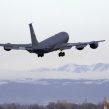
Speculation Intensifies over the Future of Manas
Publication: Eurasia Daily Monitor Volume: 6 Issue: 118
By:

The U.S. military has now started preparing to leave the Manas base in Bishkek as part of its anticipated eviction, according to Colonel Christopher Bence, the newly-appointed commander of the airbase. The United States military will vacate Manas by August 18, as the Kyrgyz regime first officially demanded in February.
Despite these latest developments, the Kyrgyz President Kurmanbek Bakiyev might still overturn his decision to shut the base. The final verdict is contingent on a possible agreement between the U.S. President Barack Obama and his Russian counterpart Dmitry Medvedev in July when both leaders meet in Moscow. Should Obama and Medvedev agree to "reset" their view of Kyrgyzstan’s place within U.S.-Russian relations, the base might avoid closure. The Manas base might not be the top priority during Obama’s visit to Moscow, but depending on the outcome of the meeting, it will determine Bakiyev’s own stance towards the future U.S. military presence in Kyrgyzstan.
Last week the possibility of retaining the U.S. base in Kyrgyzstan was apparently increasing for two main reasons. First, Obama addressed a letter to the Kyrgyz government expressing his gratitude for its collaboration in the anti-terrorist campaign in Afghanistan. The U.S. leader then expressed hope for more fruitful cooperation in the future. Kyrgyz officials, in return, promised to reply to Obama with a letter outlining the country’s national interests. Bakiyev has not made clear what national interests he is currently pursuing, or if any formal response has been submitted. But many in Bishkek have speculated that Bakiyev will not be able to resist Obama’s offer for further collaboration
Second, during his visit to Bishkek earlier this month, Afghan President Hamid Karzai asked Bakiyev to retain the Manas base for the purpose of combating terrorism in Afghanistan. Karzai’s message was strong, as he also voiced the opinion of the international anti-terrorist coalition.
On June 16, Bakiyev and Karzai met again at the Shanghai Cooperation Organization’s (SCO) summit in Yekaterinburg. The precise details of their meeting are currently unavailable, but according to the Kyrgyz press, Karzai asked his Kyrgyz counterpart to maintain the base for cargo transit (www. 24.kg, June 17). In return, Bakiyev acknowledged the importance of the Manas base in promoting regional stability, but provided no further details.
Only a few days before announcing that the U.S. military is gradually moving out of Manas, both Kyrgyz officials and Colonel Bence discussed the possibility of keeping the U.S. base operational. It was evident that news about the final order from Washington to leave Manas came as a surprise to Kyrgyz observers. On June 11, Aleksandr Knyazev, a fierce opponent of the U.S. presence in Kyrgyzstan, expressed his confidence that the U.S. government might be willing to pay $350 million in annual rental charges to Kyrgyzstan to preserve the base (www.24.kg, June 11).
Since Bakiyev announced his decision to expel the U.S. base in February, both the Kyrgyz and U.S. governments have denied that any negotiations were taking place between the two sides. According to Jamestown sources, however, the Kyrgyz government had expected Washington to compete with the Russian promise of $2 billion in loans. The U.S. government, in the meantime, has promised $30 million in aid. The financial assistance, according to some U.S. officials, was made available in return for Kyrgyzstan’s consent to retain the base (EDM, May 14). Throughout this period of uncertainty, the Russian leadership has refrained from making any official statements on the issue.
In the meantime, the Kyrgyz government is advancing closer cooperation with the Kremlin. Russian natural gas monopolist Gazprom has emerged as a likely buyer of Kyrgyzgas, the state-owned venture trading gas in Kyrgyzstan. Furthermore, the construction of the Kambarata-1 hydropower station is funded by the Russian loan. The loans and trade agreements, such as those with Gazprom and Kambarata-1 are personally controlled by the present regime in Kyrgyzstan.
In this ongoing uncertainty surrounding the Manas base, Bakiyev has shown himself to be an unpredictable and yet shrewd politician. His domestic and international policies were guided by the overarching interest of preserving his power. Bakiyev scheduled the snap presidential elections for July 23, before the final eviction date for the U.S. airbase. By juggling promises to shut the U.S. base and mooting the idea of opening negotiations with Washington, while receiving support from both, Bakiyev hoped to secure his re-election next month. Whether the U.S. base will remain in Kyrgyzstan after the August 18 deadline will become clearer after the Obama-Medvedev meeting in Moscow and the presidential election in Kyrgyzstan. As one NGO activist from Bishkek commented to Jamestown, should the U.S. base ever leave Kyrgyzstan, the Bakiyev regime will find itself forgotten by both Russia and the United States.




